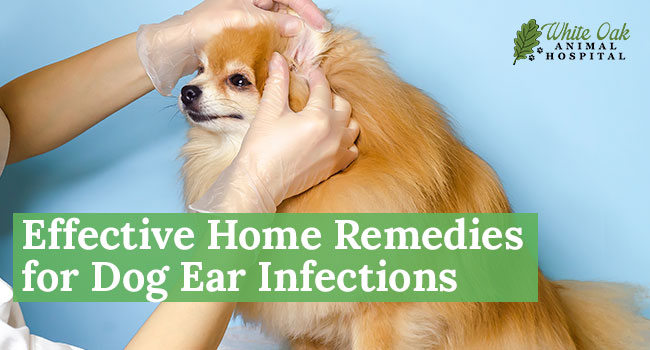
Understanding the prevalence of these infections and the effectiveness of home remedies for dog ear infections is crucial for pet owners to ensure their furry companions’ well-being. In this section, we will explore the prevalence of ear infections in dogs, underscore the importance of timely intervention, and delve into home remedies’ role in addressing this common issue.
Understanding Dog Ear Infections
Merely treating the symptoms may not suffice; it’s crucial to identify and address the underlying causes to ensure effective infection management. By understanding the root causes and recognizing the signs of ear infections, pet owners can take proactive measures to support their dogs’ ear health and overall well-being.
Home remedies for dog ear infections can relieve and promote healing, complementing veterinary care where necessary.
Common Causes of Dog Ear Infections
Regarding dog ear infections, several common triggers can lead to discomfort and irritation for our furry companions. These include allergies, moisture buildup, ear mites, foreign objects, and wax accumulation. Whether food-related or environmental, allergies can cause inflammation and increase susceptibility to infections.
If left unaddressed, wax buildup can trap bacteria and contribute to infection. Understanding these common causes empowers pet owners to take proactive steps in preventing and managing dog ear infections, including utilizing appropriate home remedies for dog ear infections.
Home Remedies for Dog Ear Infections
Apple cider vinegar solution
Gently soak a cotton ball in the solution and carefully wipe the inside of your dog’s ear, avoiding the ear canal’s deep areas. Repeat this process once or twice daily, depending on the severity of the infection. However, it’s essential to consult with your veterinarian before using any home remedy, including apple cider vinegar, to ensure it’s suitable for your dog’s specific condition.
Home remedies for dog ear infections, like apple cider vinegar, can complement veterinary care and contribute to your pet’s overall well-being.
Coconut oil
Gently massage the base of the ears to help the oil penetrate and soothe the skin. Repeat this process once or twice daily until the symptoms subside. However, it’s crucial to consult your veterinarian before using coconut oil or other home remedies for dog ear infections to ensure they suit your pet’s specific condition. Incorporating coconut oil into your dog’s ear care routine can provide relief and promote healing, complementing veterinary treatment as needed.
Witch hazel
Repeat this process once or twice daily until the symptoms improve. However, it’s essential to consult your veterinarian before using witch hazel or other home remedies for dog ear infections to ensure it’s appropriate for your pet’s specific condition. Incorporating witch hazel into your dog’s ear care routine can provide relief and promote healing, complementing veterinary treatment as needed.
Aloe vera gel
Aloe vera gel is renowned for its soothing properties, making it a safe and effective remedy for alleviating discomfort associated with dog ear infections. Rich in antioxidants and anti-inflammatory compounds, aloe vera gel can help reduce irritation and promote healing in your pet’s ears. To use aloe vera gel for your dog’s ear infection, use pure, organic gel without added ingredients like alcohol or fragrance.
Implementing Home Remedies
When applying the chosen home remedies for dog ear infections, use a gentle touch and avoid inserting anything deep into your dog’s ear canal to prevent injury. Consider using a cotton ball or pad to apply the solution to the inner surface of the ear. Be consistent with the application, following the recommended frequency outlined by your veterinarian or the remedy’s instructions.
Monitor your dog’s response closely and discontinue use if any adverse reactions occur. With regular application, you can expect to see improvement in your dog’s ear condition, but always consult your veterinarian for guidance tailored to your pet’s needs.
When to Seek Veterinary Care
Knowing when to seek veterinary care for your dog’s ear infection is crucial to ensuring their health and well-being. While home remedies for dog ear infections can relieve mild cases, specific indicators suggest that professional intervention may be necessary. If your dog’s symptoms persist or worsen despite consistent application of home remedies, it’s essential to consult your veterinarian promptly.
Remember, your pet’s health is paramount, and timely veterinary care ensures comprehensive treatment for their ear infection, promoting a swift and successful recovery.
While home remedies for dog ear infections can be beneficial for providing relief and managing mild cases, it’s essential to recognize the limitations and when to seek professional veterinary care. Consulting a veterinarian is paramount if your dog’s symptoms persist or worsen or you notice severe symptoms such as pain, swelling, or bleeding from the ears.
White Oak Animal Hospital offers comprehensive care for your pet’s ear health needs. With over 28 years of experience, our team provides integrative options, including TCVM telemedicine consultations, to address your pet’s concerns. Trust in our expertise and commitment to your pet’s well-being, and let us guide you through effective treatment options tailored to your furry friend’s needs. Your pet’s health and happiness are our top priorities.
Frequently Asked Questions
Can I use human ear drops for my dog’s ear infection?
It’s best to consult your veterinarian before using human ear drops on your dog. Some ingredients may harm pets, and specific formulations are needed for canine ear care.
How often should I clean my dog’s ears to prevent infections?
The frequency of ear cleaning depends on your dog’s breed, activity level, and susceptibility to infections. Generally, cleaning once a month is sufficient for most dogs, but consult your veterinarian for personalized recommendations. Are there any natural supplements I can give my dog to prevent ear infections?
Certain supplements like omega-3 fatty acids and probiotics may support your dog’s ear health. However, always consult your veterinarian before starting any new supplements to ensure they are safe and appropriate for your pet’s needs.